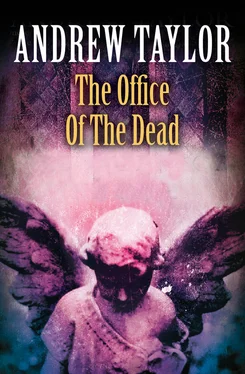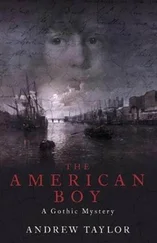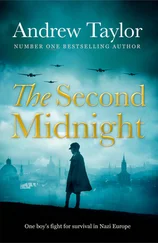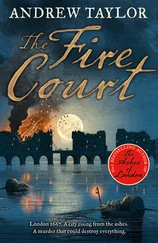To tell the truth, I was jealous when Janet admired my doomed brothers, but I was never jealous of the friendship between Janet and my mother. It was not something that excluded me. In a sense it got me off the hook. When Janet was staying with us, I didn’t have to feel guilty.
During that first visit, my mother made Janet a dress, using precious pre-war material she’d been hoarding since 1939. I remember the three of us in the little sewing room on the first floor. I was sitting on the floor reading a book. Every now and then I glanced up at them. I can still see my mother with pins in her mouth kneeling by Janet, and Janet stretching her arms above her head like a ballet dancer and revolving slowly. Their faces were rapt and solemn as though they were in church.
Janet and I shared dreams. In winter we sometimes slept together, huddled close to conserve every scrap of warmth. We pooled information about proscribed subjects, such as periods and male genitalia. We practised being in love. We took it in turns at being the man. We waltzed across the floor of the library, humming the Blue Danube. We exchanged lingering kisses with lips damped shut, mimicking what we had observed in the cinema. We made up conversations.
‘Has anyone ever told you what beautiful eyes you have?’
‘You’re very kind – but really you shouldn’t say such things.’
‘I’ve never felt like this with anyone else.’
‘Nor have I. Isn’t the moon lovely tonight?’
‘Not as lovely as you.’
And so on. Nowadays people would suggest there was a lesbian component to our relationship. But there wasn’t. We were playing at being grown up.
Somewhere in the background of our lives, the war dragged on and finally ended. I don’t remember being frightened, only bored by it. I suppose peace came as a relief. In memory, though, everything at Hillgard House went on much as before. The school was its own dreary little world. Rationing continued, and if anything was worse than it had been during the war. One winter the snow and ice were so bad the school was cut off for days.
Our last term was the summer of 1948. We exchanged presents – a ring I had found in a dusty box on top of my mother’s wardrobe, and a brooch Janet’s godmother had given her as a christening present. We swore we would always be friends. A few days later, term ended. Everything changed.
Janet went to a crammer in London because the Treevors had finally woken up to the fact that Hillgard House was not an ideal academic preparation for university. I went home to Harewood Drive, helped my mother about the house and worked a few hours a week in my father’s shop. There are times in my life when I have been more unhappy and more afraid than I was then, but I’ve never tasted such dreariness.
The only part I enjoyed was helping in the shop. At least I was doing something useful and met other people. Sometimes I dealt with customers but usually my father kept me in the back, working on the accounts or tidying the stock. I learned how to smoke in the yard behind the shop.
I got drunk for the first time at a tennis club dance. On the same evening a boy named Angus tried to seduce me in the groundsman’s shed. It was the sort of seduction that’s the next best thing to rape. I punched him and made his nose bleed. He dropped his hip flask, which had lured me into the shed with him. I ran back to the lights and the music. I saw him a little later. His upper lip was swollen and there was blood on his white shirtfront.
‘Went out to the gents,’ I heard him telling the club secretary. ‘Managed to walk into the door.’
The club secretary laughed and glanced in my direction. I wondered if I was meant to hear, I wondered if the secretary knew, if all this had been planned.
It was a way of life that seemed to have no end. Janet wrote to me regularly and we saw each other once or twice a year. But the old intimacy was gone. She was at university now and had other friends and other interests.
‘Why don’t you go to university?’ she asked as we were having tea at a café in the High on one of my visits to Oxford.
I shrugged and lit a cigarette. ‘I don’t want to. Anyway, my father wouldn’t let me. He thinks it’s unnatural for women to have an education.’
‘Surely he’d let you do something?’
‘Such as?’
‘Well, what do you want to do?’
I watched myself blowing smoke out of my nostrils in the mirror behind Janet’s head and hoped I looked sophisticated. I said, ‘I don’t know what I want.’
That was the real trouble. Boredom saps the will. It makes you feel you no longer have the power to choose. All I could see was the present stretching indefinitely into the future.
But two months later everything changed. My father died. And three weeks after that, on the 19th July 1952, I met Henry Appleyard.
4 4 5 6 7 Part II: The Close 8 9 10 11 12 13 14 15 16 17 18 19 20 21 22 23 24 25 26 27 28 29 30 31 32 33 34 35 36 37 38 39 40 41 42 43 Part III: The Blue Dahlia 44 45 46 47 48 49 Keep Reading About the Author Author’s Note Praise Also by the Author About the Publisher
Memory bathes the past in a glow of inevitability. It’s tempting to assume that the past could only have happened in the way it did, that this event could only have been followed by that event and in the order they happened. If that were true, of course, nothing would be our fault.
But of course it isn’t true. I didn’t have to marry Henry. I didn’t have to leave him. And I didn’t have to go and stay with Janet at the Dark Hostelry.
During her last year at Oxford, Janet decided that after she had taken her degree she would go to London and try to find work as a translator. Her mother’s contacts might be able to help her. She told me about it over another cup of tea, this time in her cell-like room at St Hilda’s.
‘Is it what you want to do?’
‘It’s all I can do.’
‘Couldn’t you stay here and do research?’
‘I’ll be lucky if I scrape a third. I’m not academic, Wendy. I feel I don’t really belong here. As if I got in by false pretences.’
I shrugged, envious of what she had been offered and refused. ‘I suppose there are lots of lovely young men in London as well as Oxford.’
‘Yes. I suppose so.’
Men liked Janet because she was beautiful. She didn’t say much to them either so they could talk to their hearts’ content and show off to her. But she went out of her way to avoid them. Janet wanted Sir Galahad, not a spotty undergraduate from Christchurch with an MG. In the end, she compromised as we all do. She didn’t get Sir Galahad and she didn’t get the spotty undergraduate with the MG. Instead she got the Reverend David Byfield.
Early in 1952 he came over to Oxford for a couple of days to do some work in the Bodleian. He was writing a book reinterpreting the work of St Thomas Aquinas in terms of modern theology. That’s where he and Janet saw each other, in the library. It was, Janet said, love at first sight. ‘He looked at me and I simply knew.’
Even now, I find it very hard to think objectively about David. The thing you have to remember is that in those days he was very, very good-looking. He turned heads in the street, just as Janet did. Like Henry, he had charm, but unlike Henry he wasn’t aware of it and rarely used it. He had a first-class degree in theology from Cambridge. Afterwards he went to a theological college called Mirfield.
‘Lots of smells and bells,’ Janet told me, ‘and terrifyingly brainy men who don’t like women.’
‘But David’s not like that,’ I said.
‘No,’ she said, and changed the subject.
After Mirfield, David was the curate of a parish near Cambridge for a couple of years. But at the time he met Janet he was lecturing at Rosington Theological College. They didn’t waste time – they were engaged within a month. A few weeks later, David landed the job of vice-principal at the Theological College. They were delighted, Janet wrote, and the prospects were good. The principal was old and would leave a good deal of responsibility to David. David had also been asked to be a minor canon of the Cathedral, which would help financially. The bishop, who was chairman of the Theological College’s trustees, had taken quite a shine to him. Best of all, Janet said, was the house that came with the job. It was in the Cathedral Close, and it was called the Dark Hostelry. Parts of it were medieval. Such a romantic name, she said, like something out of Ivanhoe. It was rather large for them, but they planned to take a lodger.
Читать дальше












